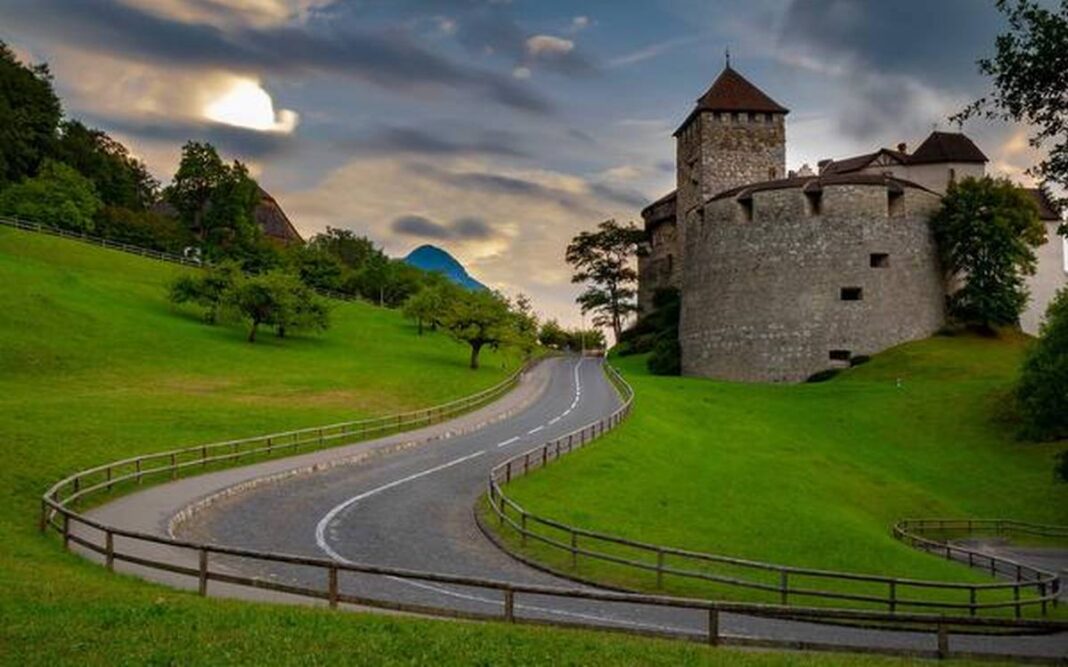Liechtenstein has a rich history given its central location in Europe. Its borders have remained unchanged for nearly 300 years. Today it stands as the last existing remnant of the Holy Roman Empire. The Principality has evolved from being a very poor agricultural society to one of the most highly industrialized countries in the world.
Early History
The territory occupied by the Principality of Liechtenstein has been continually inhabited by settled farming communities since the Later Stone Age (4000 – 1800 BC). By 15 BC, the area was incorporated into the Roman province of Raetia. After the decay of the Roman Empire in the 5th century, Raetia was first incorporated into Charlemagne’s Frankish empire and then from the 10th century on, was part of the Holy Roman Empire. Raetia was divided through inheritances after the 12th century and imperial immediacy was bestowed upon the sovereigns of the county of Vaduz beginning in 1396. Although endowed with few natural resources and under constant threat of flooding due to the Rhine river, Vaduz’s imperial immediacy was confirmed by successive emperors and became central to its historical importance.
Vaduz and Schellenberg
The counties of Vaduz and Schellenberg (forming modern-day Liechtenstein) repeatedly changed hands between 1416 and 1613, and finally came to rest with the Counts of Hohenems. Under the rule of the Hohenems’, Vaduz and Schellenberg experienced one of their saddest chapters in history. The plague repeatedly struck the area and the witch persecutions following the 30 Years War took the lives of about 180 people. Throughout this period, the Hohenems became deeply indebted and were forced to sell the counties of Vaduz and Schellenberg to the House of Liechtenstein in 1699 and 1712 respectively. The Princes of the House of Liechtenstein had been acting as advisors to the Habsburg dynasty since the 13th century. The House of Liechtenstein held lands in Moravia, Lower Austria, and Bohemia, but all of these lands were subject to more senior feudal lords. Although the rulers of Liechtenstein had been elevated to the rank of prince in 1608, the Princes strove to gain unmittelbare lands (subject to no other feudal rulers except the Emperor of the Holy Roman Empire) in an effort to increase their power and gain a seat in the Imperial diet in Vienna. In 1699 and 1712 they became successful with the purchases of Vaduz and Schellenberg. With the purchases of the two counties, the Princes of Liechtenstein had greatly increased their power. The Holy Roman Emperor Charles VI united Vaduz and Schellenberg in 1719, and then elevated the territory to the rank of Reichsfürstentum (Imperial Principality). Liechtenstein therefore became a sovereign member of the Holy Roman Empire, and the Princes of the House of Liechtenstein could take a seat at the Imperial Diet. However, since the House of Liechtenstein’s main holdings were in Austria and Moravia, no Prince set foot in Liechtenstein until 1842.
The Rhine Confederation and the German Confederation
As a result of the Napoleonic Wars, the Holy Roman Empire was under the control of French Emperor Napoleon I. When Napoleon dissolved the Holy Roman Empire and created the Rhine Confederation, Liechtenstein was released from its service to the former Emperor and gained its sovereignty through admission to the Confederation in 1806. Although greatly coveted by neighboring Bavaria, Napoleon’s influence and compromises protected Liechtenstein from its neighbor. Upon Napoleon’s defeat and the dissolution of the Rhine Confederation in 1813, Liechtenstein represented itself at the Congress of Vienna and became one of the 39 new member states of the German Confederation, thereby reconfirming its sovereignty. In order to meet its obligations under the German Confederation, Prince Johann I granted the Principality a limited constitution in 1818. Although including no guarantees of basic rights, the constitution did include provisions for a well controlled assembly that could approve of taxation requirements and make suggestions for the public well-being. Under the confederation, Liechtenstein was also compelled to maintain a military force. The Austro-Prussian War, in which Austria mobilized the German confederation against Prussia, ended with the defeat of Austria and the dissolution of the German Confederation. This released Liechtenstein from its compulsory military force, and gave the Parliament the opportunity to refuse to fund any more military expenditures. In 1868, reigning Prince Johann II acquiesced to Parliament’s wishes and disbanded the 80 man army.
The World Wars
Until World War I, Liechtenstein was economically oriented toward Austria-Hungary by means of a customs treaty signed in 1852. While Liechtenstein remained neutral during World War I, it was severely affected by the economic measures levied against Austria-Hungary which led to widespread hunger and an almost full stop to industrial output. Due to general unrest after the war, a new constitution allowing for significant direct democracy was negotiated and ratified by Prince Johann II in 1921. Following the collapse of the Austro-Hungarian Empire in 1918, Liechtenstein reoriented itself economically towards Switzerland. This relationship was stabilized by a joint customs treaty and the introduction of the Swiss franc as the official currency in 1924. Upon Germany’s annexation of Austria in 1938, Prince Franz Joseph II became the first reigning prince to take up residence in Vaduz Castle. Along with Switzerland, Liechtenstein remained successfully neutral during World War II and greatly benefited from its customs and currency union with Switzerland.
Post-World War II Economic Growth
Following World War II, Liechtenstein’s economy grew around highly specialized industrial firms, while also being active in the international financial sector. Liechtenstein went from a poor agrarian country to a modern society with a diversified economy. Within a few decades, Liechtenstein could no longer provide the manpower that its economy needed. This shortage of workers meant that even to this day, Liechtenstein’s economy is partially dependent on foreign workers (mostly from Switzerland and Austria).
Liechtenstein
Original German Words
Oben am jungen Rhein
Lehnet sich Liechtenstein
An Alpenhöh’n.
Dies liebe Heimatland,
Das teure Vaterland,
Hat Gottesweise Hand
Für uns erseh’n.
Hoch lebe Liechtenstein
Blühend am jungen Rhein,
Glücklich und treu.
Hoch leb’ der Fürst vom Land,
Hoch unser Vaterland,
Durch Bruderliebe-Band
Vereint und frei.
English:
High above the young Rhine
Lies Liechtenstein, resting
On Alpine heights.
This beloved homeland,
This dear fatherland
Was chosen for us by
God’s wise hand.
Long live Liechtenstein,
Blossoming on the young Rhine,
Happy and faithful!
Long live the Prince of the Land,
Long live our fatherland,
United by brotherly bonds and free!
Liechtenstein is home to some of Europe’s most illustrious celebrations. Music plays an important role in the yearly festivals, but so does cuisine, dance and history. The nation stops for its annual Liechtenstein holiday- National Day on August 15, with plenty of festivities and fireworks throughout the land. Another energetic day is the Monster Concert, which is held in the town of Schaan.
Operettas in Vaduz/Balzers
Rotating between cities each year, the Liechtenstein Operettas is a three month opera celebration. The festivals are held either in Balzers or Vaduz and generally last from the end of January through the middle of March.
Monster Concert
Held in the town of Schaan during the month of March, the Monster Concert is one of the annual Fasching events, and has rocked since 1958. Music is played and dancing in the streets is the norm, with thousands of visitors adding to the spectacle every year.
Treisenberg Spring
Taking place over a weekend at the end of March, the Treisenberg Spring festival is a celebration of the coming warm season in Liechtenstein. Classical music is used to entertain the masses and amazing rhythms can be heard echoing throughout the township, keeping alive the golden oldies from the likes of Bach, Wendling and Telemann.
Bargar-Fruahlig-Mountain Spring
After a long winter, visitors celebrate the coming warmth at the traditional Treisenberg Spring festival in April and May. However, the event is more about cuisine than music, with local restaurants, Café Guflina and Restaurant Kainer, offering a magnificent selection of spring foods.
LGT Alpine Marathon
The annual LGT Alpine Marathon is one of the most exciting sporting events on the Liechtenstein calendar. On June 16, runners from around Europe and the UK flock to Bendern for 42 kms of excitement. Most of the course is at an altitude of about 5900 feet.
Film Festival Vaduz
For two weeks in July, Vaduz turns on the charm when it hosts its annual film festival. Flicks from around Liechtenstein, Europe, and other parts of the globe are screened, mostly in beautiful open air cinemas around the capital.
National Day of Liechtenstein
Held on August 15, National Day of Liechtenstein is celebrated across the country. Musical events, parades, dance performances, games, and traditional cuisine are the center of attention until 10:00 p.m. when fireworks light up the sky near Vaduz Castle.
Liechtenstein Guitar Days
This weeklong festival held in July, brings the best guitar players from around the country and Europe to Eschen. An international competition is what attracts the most visitors, but there are also plenty of workshops and concerts.








[…] arrived into the area, bent on protecting their individual claims to the islands. Two civil wars erupted in 1889 and 1898 respectively. The British, American, and German military assisted the warring […]
[…] And lead our people happily forever Peacefully be, the Kingdom And Sultan Lord, save Brunei, the Abode of […]